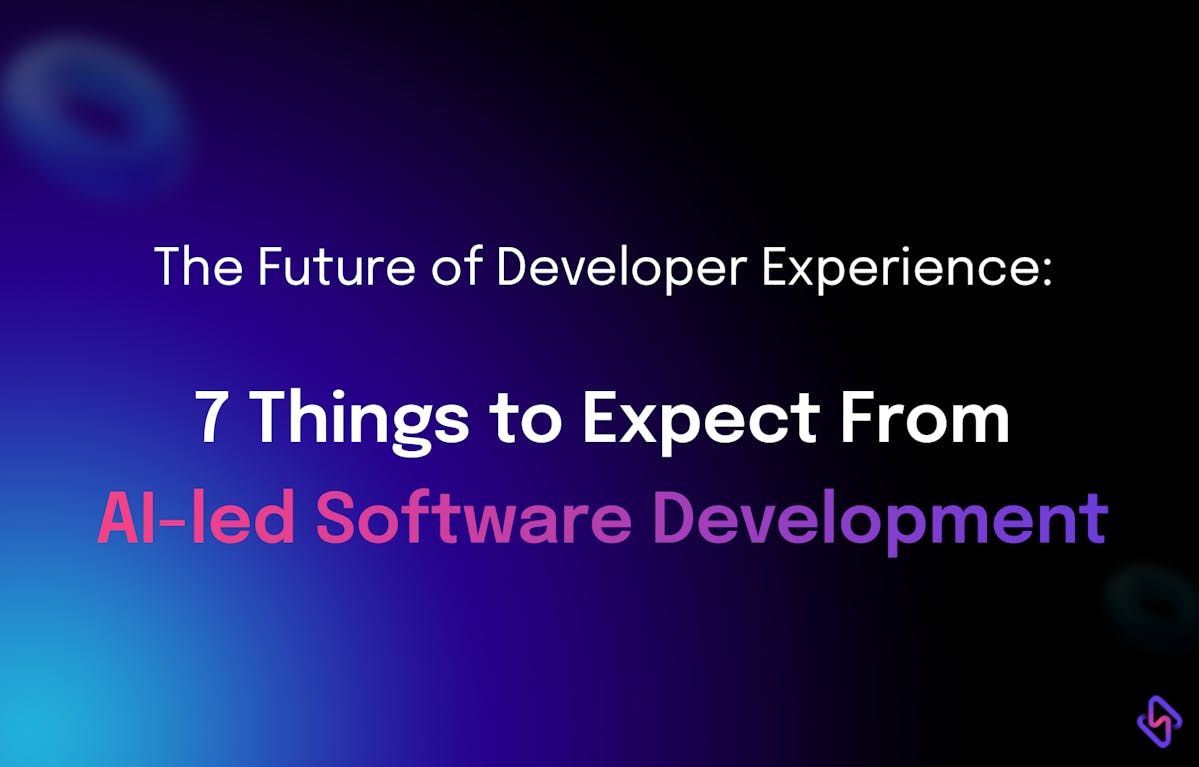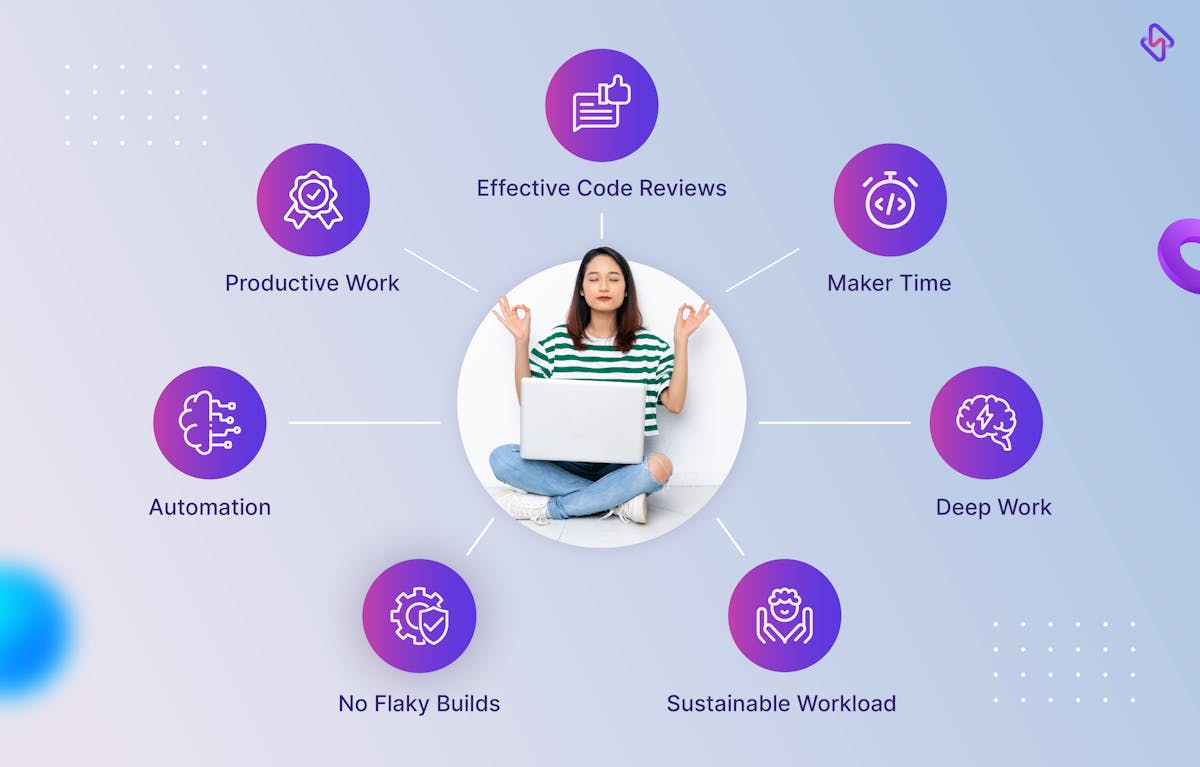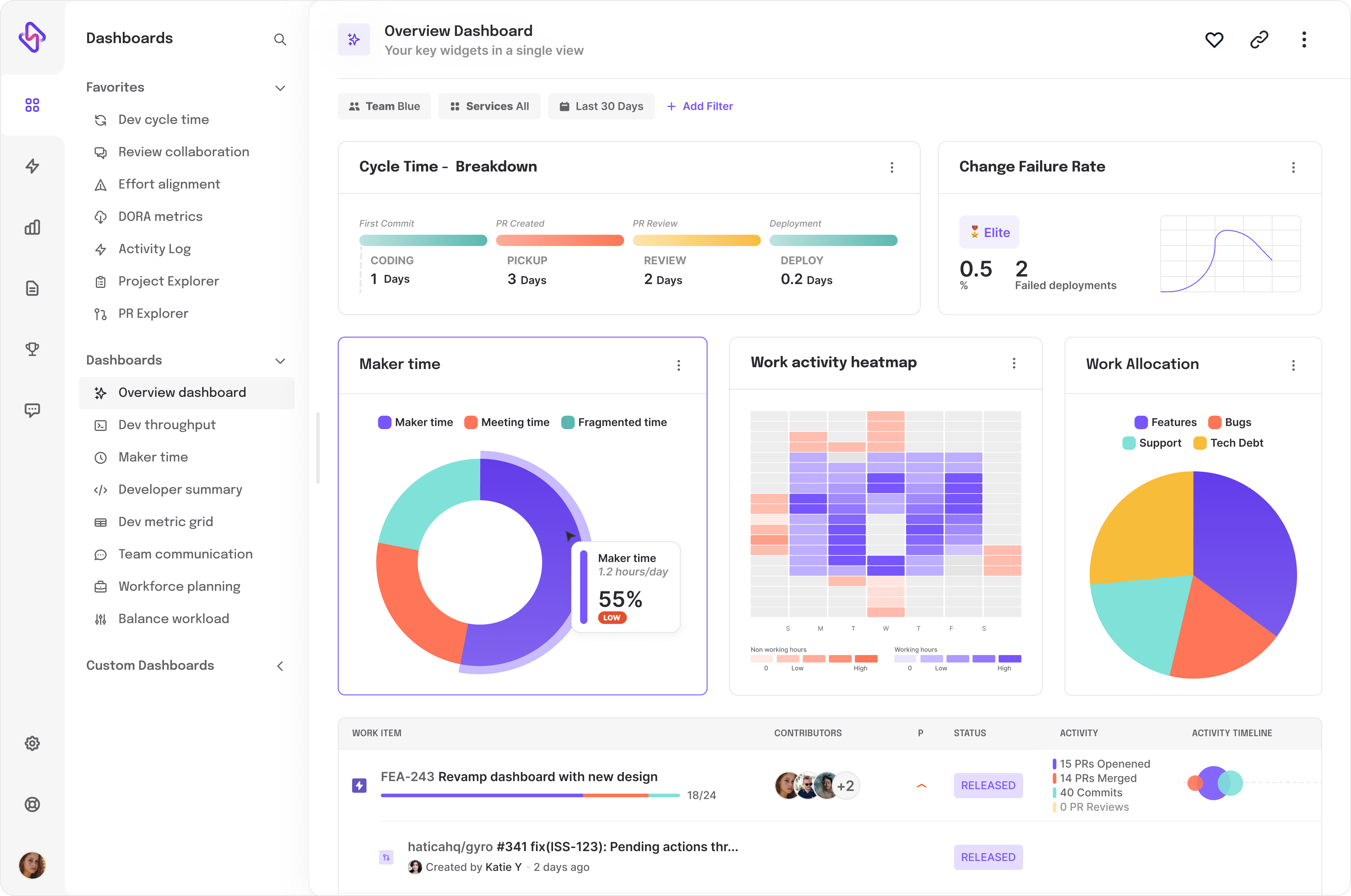An Accenture study found that 73% of organizations are prioritizing artificial intelligence (AI) over all their digital transformation investments in 2023. Developer experience too is a top priority with 58% of engineering leaders admitting that developer experience is extremely critical for the C-suite.
The icing on the cake, the two priorities i.e., AI & developer experience are symbiotic as well as complementary in nature.
Improving developer experience can enhance the efficacy with which your engineering teams adopt new AI technologies. When harnessed right these AI technologies can help you enhance the developer experience (DevEx) you deliver.
This article dives into the intricacies of the what difference AI-led software development will make on developer experience and productivity in 2024 and the times to come.
Why should engineering leaders be keen on AI & DevEx in 2024?
Today, it is important for engineering managers to understand how AI influences developer experience as stakeholders at almost every organization are getting restless and are eagerly eyeing results from AI initiatives. Tech managers are being bogged down now and then for updates on where their org stands in the AI adoption journey, and how well-equipped your org is to embrace the digital disruption AI will unleash.
Anyway, no matter how curious the stakeholders get, we can’t blame them. Not their fault.
Artificial intelligence is the latest tech frenzy and everyone seems to be engrossed in it. The fervor surrounding AI is showing no signs of waning. It’s breaching new heights every day.
Thanks to AI, today, the entire tech industry is at an exciting inflection point.
Mostly, the views around AI are optimistic. Dan Ives, managing director of equity research at Wedbush Securities, says that AI is the most transformational tech in the last 30 years. Sundar Pichai, Google’s CEO, holds a similar view. He said that AI is “the most profound technology humans are working on”.
But the fear lingers too.
Is AI the new tech bubble? Is AI just a fad? Or is AI truly a transformational tech?
Well, time is the best storyteller, and it will pass its verdict. For now, AI seems to be capturing everyone’s imagination— from writers & journalists to photographers, filmmakers, scientists, software developers, and engineering teams at large.
And rightly so. AI gets the closest to the essence of human intelligence i.e., our neural system and cognitive system, and how we reason based on symbolic representations.
Does that mean AI will become sentient at some point?
For now, companies are looking to ride this AI-led digital transformation wave and squeeze in more revenue and profits by leveraging AI technologies. The industry as a whole is working towards hacking AI solutions that make developers and organizations build more innovative solutions faster and more responsibly.
And as mentioned earlier, one of the core fronts where AI is leaving its mark is developer experience & productivity.
However, to better grasp AI’s influence on developer experience, you must understand how developers are using AI i.e., the key value propositions & benefits of AI for developers, and how AI impacts developer productivity.
How Developers Are Using AI Tools For Software Development?
As per Github, 92% of developers in the USA are already using AI coding tools.
Developers are using Amazon’s Codewhisperer, Github’s Copilot, Google’s Codey, Tabnine, Codeium, and a plethora of AI tools for diverse use cases in their SDLC workflows. But a majority of developers use AI tools for the following-
- Writing code and debugging code
- Knowledge Transfer
- Testing code & Data
- Code reviews
- Deployment & Observability
- Architecture Designs
In short, AI tools are developers' new best friend and their 24*7 pair programmers. Why else do you think they named it Copilot?
Are Developers Using AI Tools?
- Globally, 44% of developers are already using AI tools in their SDLC workflows. Mostly, they use ChatGPT (83%) and Github Copilot (56%).
- 83% of developers who have embraced AI developer tools are using them for writing code, and 49% for debugging code.
- The adoption among upcoming developers i.e., those who are learning to code is higher, 55%.
Are AI tools Improving Developer Productivity?
These AI coding tools boost developer productivity effectively if the developer is well-versed in his/her tech stack. Otherwise, AI development tools can be equally counterproductive.
A real-life example of AI tools being unproductive.
Let’s say, you are working on developing an intelligence tool that tracks brand mentions across the web. For that, you are supposed to scrape content from the web. You decided to use DynamoDB (a managed AWS database) & Scrapy (an open-source data extraction framework). To speed up your process, you enter a prompt that says-
“I want to use DynamoDB with Scrapy. Give me the code to integrate both.”
ChatGPT or your code generation tool of preference might give you a solution that uses Boto3 (an AWS SDK for Python). As that’s the most popular one.
But what if you are not well versed with Boto3?
You will struggle to use the ChatGPT-generated code. You won’t understand the complete functionality or what the code is doing. You don’t even know if it’s accurate or if it will introduce vulnerabilities.
In such cases, the AI tools for developers prove to be counterproductive. But let’s say, you are versed in pynamodb (a pythonic interface to Dynamodb). Then you can specify the same in the Prompt. “I want to use DynamoDB with Scrapy Framework. Give me the code using pynamodb.”
Now, as you’re specific with what exactly you need from your AI developer tool, it may help speed up your coding process and subsequently improve your overall productivity.
A McKinsey report reaffirms this. AI does help speed up code documentation by 50%, code generation by 45%, and code refactoring by 30%. However, when the complexity increases it’s not that effective. In fact, for junior developers, it sometimes takes 7% - 10% longer than without using AI tools.
Because of this, some developers refrain from using AI tools for high-complexity coding tasks. Is this all? Or are there more pieces in the AI adoption puzzle that are detrimental to the adoption of AI development tools among software developers?
Is There Resistance to AI Adoption Among Developers?
For now, trust is a key challenge in AI adoption among developers.
As per the same Stackoverfow report, AI is afflicted with Helmsman’s complexity cliff. Basically, after a certain complexity level, AI’s ability to generate accurate solutions drops off.
Low confidence in the accuracy of AI developer tools is a concern among developers-
- 27.2% of developers don’t trust it
- 39.3% do trust the code generated by these AI dev tools to an extent
- 2.85% highly distrust it
But trust isn’t the only impediment, local laws, policies, workplace regulations, privacy, and copyright infringement challenges are keeping developers from rapid AI adoption in their SDLC workflows.
Artificial Intelligence (AI) and Developer Experience (DevEx)
Before we can fathom AI’s impact on Developer Experience, it is important to understand what exactly DevEx means.
In simple words, Developer Experience encompasses every single aspect of software development that influences ‘how a developer feels’--- from how requirements gathering, development, testing, debugging, deployment, and maintenance processes are implemented to the tools they use at each of these stages and the organizational culture, SDLC practices, and employee experience, just everything.




